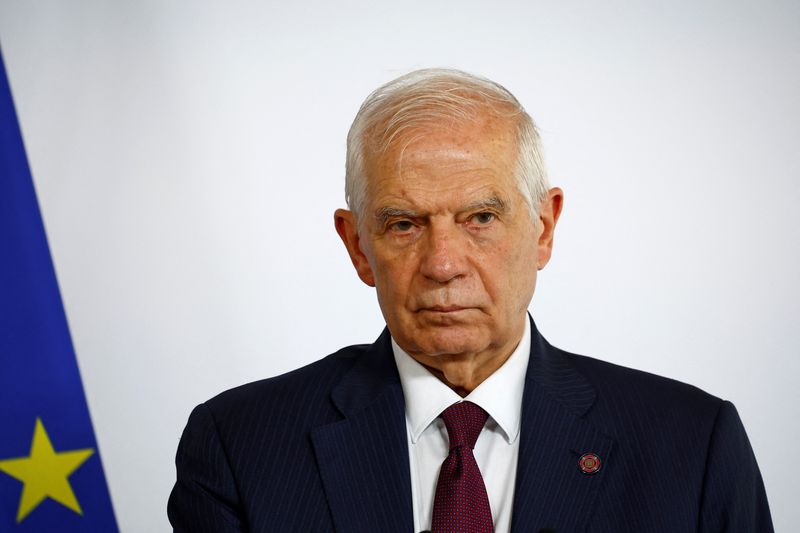By Andrew Gray and Benoit Van Overstraeten
BRUSSELS (Reuters) -The European Union will prepare to expand its sanctions on Iran in response to Tehran’s attack on Israel, EU top diplomat Josep Borrell said on Tuesday after an emergency video conference of the bloc’s foreign ministers.
Borrell cited U.N. Secretary-General Antonio Guterres in declaring that the Middle East was “at the edge of an abyss” following Iran’s missile and drone attack at the weekend.
“Today, ministers took a strong stance, asking all actors in the region to move away from the abyss, in order not to fall into it,” he told reporters after the meeting, called to discuss the repercussions of the Iranian attack.
Borrell, the EU’s high representative for foreign policy, warned the Middle East would be in “full war” if every development in the current crisis is followed by an escalation.
Borrell said several EU members proposed expanding a sanctions regime that seeks to curb the supply of Iranian drones to Russia to include the provision of missiles and cover deliveries to Iranian proxies in the Middle East.
Germany, France and several other EU members have publicly backed such a proposal.
Borrell said he supported the proposal and diplomats would work on it in the coming days so ministers could discuss it again at a meeting in Luxembourg on Monday.
He said some EU members also raised the prospect of sanctioning Iran’s dominant military force, the Revolutionary Guard Corps.
But Borrell reiterated the EU’s position that the corps could only be designated as a terrorist organisation if a national authority in the EU found that the group had been involved in terrorist activity.
He said the EU was not aware of any such case but he would ask the EU’s diplomatic service to examine the matter again.
Borrell said all the ministers from the 27-nation EU strongly condemned the Iranian attack and reaffirmed their commitment to Israel’s security.
But he also voiced strong criticism of Israel’s conduct of the war in Gaza, launched in response to the Hamas attack on Israel from the Palestinian enclave on Oct. 7 last year.
He said far too little aid was getting into Gaza to deal with a “catastrophic humanitarian situation” and questioned Israeli calls for Palestinians in the south of the enclave to move to the north.
“It’s impossible for any human being to live there. There is no water, there’s no electricity, there’s no sewerage. There’s no houses, there is no nothing. It’s like the moon,” he said.
“If they wanted to make Gaza a place where human life is not possible, in the north they managed to succeed.”
Israel has dismissed such accusations and Israeli officials have voiced irritation at Borrell’s repeated criticism of their conduct during the war.
Some EU member states have also voiced frustration at his criticism of Israel while others have given him strong backing.
(Reporting by Andrew Gray; Editing by Benoit Van Overstraeten and Daniel Wallis)
